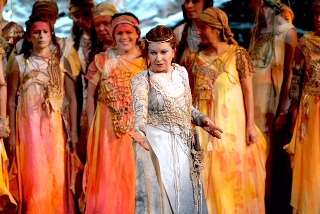|
Back
Sublimissima Devia Genova
Teatro Carlo Felice
01/24/2018 - & January 27, 28, 30, 31, 2018
Vincenzo Bellini: Norma
Mariella Devia*/Desirée Rancatore (Norma), Annalisa Stroppa*/Valentina Boi (Adalgisa), Stefan Pop*/Roberto Iuliano (Pollione), Riccardo Fassi*/Mihailo Sljivic (Oroveso), Elena Traversi (Clotilde), Manuel Pierattelli)
Coro del Teatro Carlo Felice, Franco Sebastiani (Chorus Master), Orchestra del Teatro Carlo Felice, conducted by Andrea Battistoni (Conductor)
Luigi di Gangi & Ugo Giacomazzi (Stage Directors), Federica Parolini (Sets), Daniela Cernigliari (Costumes), Luigi Biondi (Lighting)

M. Devia (© Marcello Orselli)
There was electricity in the air at the opening night of a new production of Norma at Genova’s Teatro Carlo Felice. It seemed the numerous fans of soprano Mariella Devia had made a pilgrimage to witness the artist’s Norma. German, Japanese, Spanish and especially French was heard in the foyer.
The pilgrimage was richly rewarded, as this was a performance that was as close to perfection as can be. The sets, composed of stylized reeds, were intriguingly evocative, and thanks to Luigi Biondi’s brilliant lighting, the mood varied between sombre, ferocious and outright scary. The original costumes were convincingly Gallic for the men but more Etruscan, Hittite or Phrygian for the women, possibly a deliberate attempt to allude to classical tragedy. Elaborate netting and ropes were used by the Gauls in dances and stylized moves to represent destiny. Less successful was the use of a rope during the Act II duet between Norma and Adalgisa, to represent the tension and affection between them. That idea was superfluous, even distracting, as the music and the words are powerful enough. A rope was also used to hold down Pollione in the final scene, and a bit of a choreography was employed between the doomed lovers centring on the rope. Again, the idea was not the brightest.
However, the cast was simply amazing. Even the small roles of Clotilde and Flavio were well sung and acted. Bass Riccardo Fassi had a warm, deep voice, worthy of the village’s chief, Oroveso. The only reproach was his being too young-looking to be Norma’s father. Tenor Stefan Pop has a stentorian voice suited for Pollione. He often sang louder than his partners in the duets and trio. Nonetheless, his style was rarely vulgar, and he was able to vary his voice to be utterly moving in the opera’s final scene. Mezzo Annalisa Stroppa had a fresh young voice that blended well with Devia’s in the two pivotal Adalgisa-Norma duets. This is a young singer to watch. The marvel of the evening was Mariella Devia who, at 69, puts to shame all the Normas I have heard in the past five years. This role is not just an exercise in vocalism. An understanding of the role and of the text is essential to convince, and my goodness, this beloved Italian soprano certainly did! Only a native speaker and an intelligent artist could embue the music and emotion with the magic it calls for. Her emphasis on certain words such as “Ei tornerà” evoked the paradoxical desperate hope of the abandoned lover. Likewise, Norma’s beseeching of her father to care for her children was heart-wrenching by her masterful emphasis of the words “vittime, tuo sangue” and “abbi di lor pietà.”
The great Lilli Lehmann (1848-1929) once said it was easier to sing all three Brünnhildes in one evening than one Norma. This role requires a dramatic soprano with a firm coloratura and the capacity to express emotions ranging from tenderness, friendship, maternal love, jealousy, rage, self-pity and despair. Devia delivered on all counts, and deftly navigated the vocal perils with stunning brio. It was a most memorable performance indeed, with the audience joyously intoxicated as they moved from their seats as if in a delirious haze, out of the theatre and into the night air.
Ossama el Naggar
|